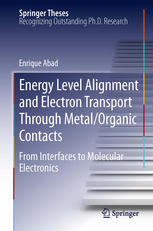

Most ebook files are in PDF format, so you can easily read them using various software such as Foxit Reader or directly on the Google Chrome browser.
Some ebook files are released by publishers in other formats such as .awz, .mobi, .epub, .fb2, etc. You may need to install specific software to read these formats on mobile/PC, such as Calibre.
Please read the tutorial at this link: https://ebookbell.com/faq
We offer FREE conversion to the popular formats you request; however, this may take some time. Therefore, right after payment, please email us, and we will try to provide the service as quickly as possible.
For some exceptional file formats or broken links (if any), please refrain from opening any disputes. Instead, email us first, and we will try to assist within a maximum of 6 hours.
EbookBell Team

4.1
80 reviewsIn recent years, ever more electronic devices have started to exploit the advantages of organic semiconductors. The work reported in this thesis focuses on analyzing theoretically the energy level alignment of different metal/organic interfaces, necessary to tailor devices with good performance. Traditional methods based on density functional theory (DFT), are not appropriate for analyzing them because they underestimate the organic energy gap and fail to correctly describe the van der Waals forces.
Since the size of these systems prohibits the use of more accurate methods, corrections to those DFT drawbacks are desirable. In this work a combination of a standard DFT calculation with the inclusion of the charging energy (U) of the molecule, calculated from first principles, is presented. Regarding the dispersion forces, incorrect long range interaction is substituted by a van der Waals potential. With these corrections, the C60, benzene, pentacene, TTF and TCNQ/Au(111) interfaces are analyzed, both for single molecules and for a monolayer. The results validate the induced density of interface states model.